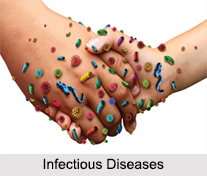 Infectious diseases are disorders caused mainly by various micro organisms like bacteria, viruses, fungi or parasites. Despite medical advances that have produced hundreds of drugs that are safe and effective against bacteria, viruses, fungi and parasites, infectious diseases are still a major cause of death, disability and social and economic upheaval for millions around the world. More than 90 percent of the deaths from infectious diseases worldwide are caused by only a handful of diseases.
Infectious diseases are disorders caused mainly by various micro organisms like bacteria, viruses, fungi or parasites. Despite medical advances that have produced hundreds of drugs that are safe and effective against bacteria, viruses, fungi and parasites, infectious diseases are still a major cause of death, disability and social and economic upheaval for millions around the world. More than 90 percent of the deaths from infectious diseases worldwide are caused by only a handful of diseases.
Causes of Infectious Diseases
Beyond the general ecology of many developing countries, a number of social and economic factors contribute to the high rates of infectious disease. Poverty, lack of access to health care, antibiotic resistance, evolving human migration patterns, new infectious agents, and changing environmental and development activities all contribute to the expanding impact of infectious diseases.
Types of Infectious Diseases
•Chicken-Pox: It is an airborne and highly contagious disease caused primarily due to the infection with Varicella Zoster virus. It spreads easily through sneezing or coughing of ill individuals and also through direct contact with the secretions of the rashes.
•Cholera: Cholera is another infectious disease which affects the small intestine and its causative agent is the bacterium Vibrio Cholerae. Cholera mainly transmits by drinking water or consuming food, contaminated by the faeces of an infected person.

•Dengue Fever: Dengue Fever is a mosquito-borne tropical disease caused by the dengue virus. Transmission of this disease occurs through several species of mosquito belonging to the genus Aedes.
•Food Poisoning: Food poisoning, also known as food borne illness, results from consuming food contaminated with pathogenic bacteria, parasites or viruses. Chemical or natural toxins also cause food poisoning.
•Influenza: Influenza, commonly referred as flu, is another infectious disease caused by RNA viruses of the family Orthomyxoviridae. Influenza generally transmits through air by sneezes or coughs which create aerosols containing the virus.
•Leprosy: Leprosy is a chronic infectious disease caused by the bacteria Mycobacterium Leprae and Mycobacterium Lepromatosis.
•Malaria: Malaria is a mosquito-borne infectious disease and its causative agent is parasitic protozoa belonging to the genus Plasmodium. It transmits through the bite of infected female Anopheles mosquito.
•Pneumonia: Pneumonia is an infectious disease which results in inflammation of lungs caused by infection with viruses or bacteria.
•Rabies: Rabies is a viral infectious disease which results in acute inflammation of the brain.
•Plague: Plague is a dreadful infectious disease. The enterobacteria Yersinia Pestis is the causative agent. Plague spreads through air, direct contact or by contaminated undercooked food or materials.
Other Infectious Diseases
In addition to these, other infectious diseases include Botulism, Common cold, Diphtheria, Filariasis, Gonorrhoea, Hepatitis, Lassa fever, Measles, Mumps, Nocardiosis, Rat-bite fever, Rubella, Shigellosis, Smallpox, Syphilis, Tetanus, Tuberculosis, Yellow fever and many more.




















